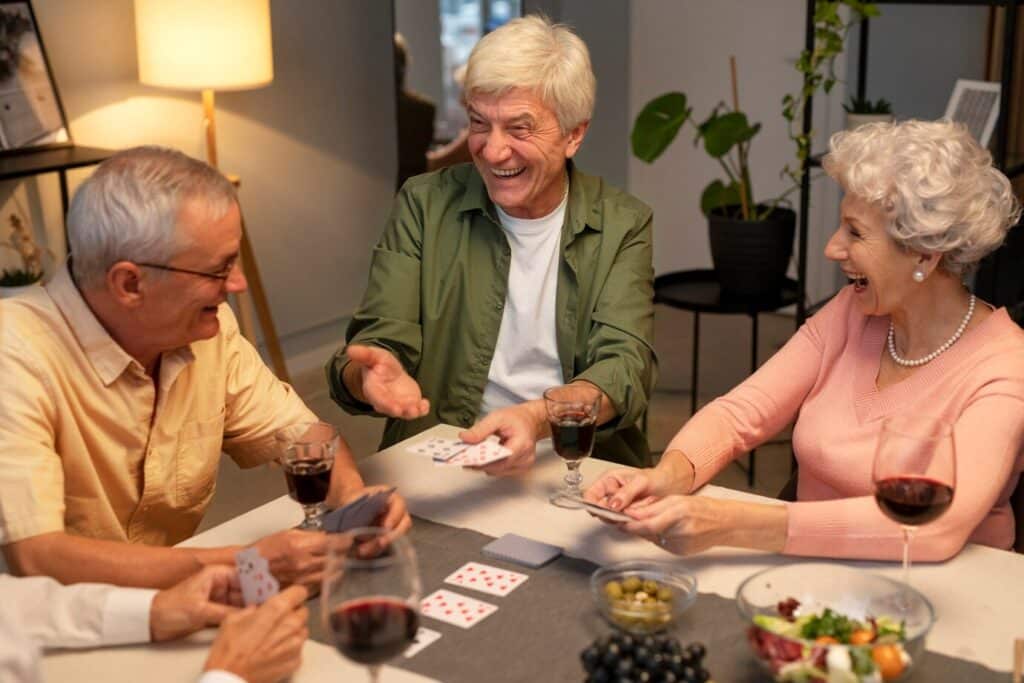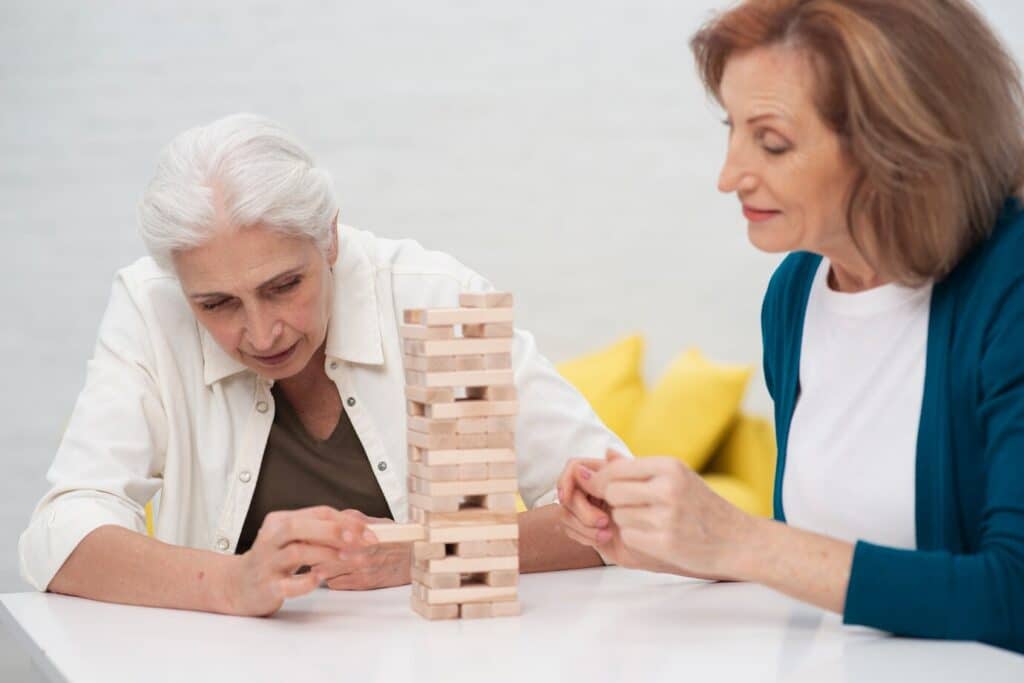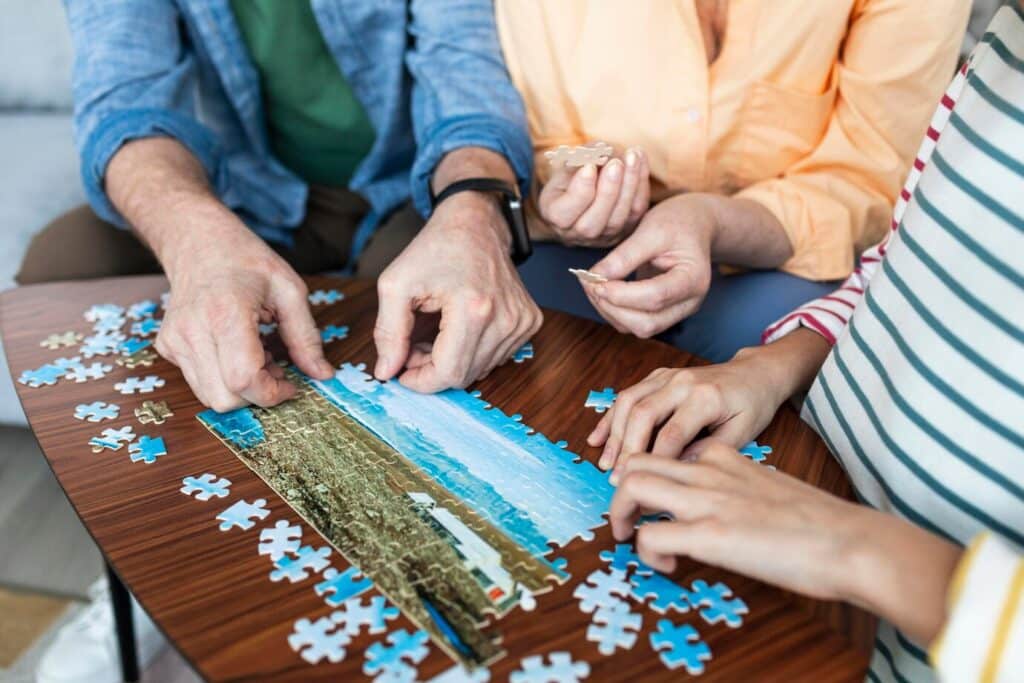Boost Mental Sharpness with Puzzle Games for Seniors
Engaging in puzzle games for seniors at Westmont of Santa Barbara is more than just entertainment—it’s an investment in cognitive health and social interaction. Puzzle games provide seniors with enjoyable mental workouts, promoting critical thinking, memory retention, and overall well-being. From classic crosswords to digital brain-teasers, these games are essential for maintaining cognitive vitality and enhancing daily life.
Activities like solving puzzles stimulate the brain and encourage social connections, bringing residents together in fun, collaborative settings. Let’s explore how incorporating these engaging activities can significantly improve the lives of seniors.
The Importance of Mental Stimulation for Seniors
As we age, mental stimulation becomes as crucial as physical exercise. Regular participation in activities such as brain games for seniors helps maintain cognitive abilities, supporting independence and quality of life. These activities sharpen memory, enhance problem-solving skills, and promote emotional well-being. Engaging in puzzles regularly can combat loneliness and foster a sense of accomplishment. Brain-boosting games in your routine is a fun way to achieve this goal. Remember, it’s never too late to start; find enjoyable activities that resonate with you. By committing to this journey, you invest in a brighter, sharper future for yourself and those you love.
Types of Puzzle Games to Enhance Cognitive Skills
Exploring diverse types of senior puzzles provides numerous cognitive benefits. Here are several recommended games:
- Crosswords and Word Puzzles. Enhance language skills and stimulate creativity.
- Sudoku. Strengthen logical reasoning and numeric agility.
- Memory Exercises. Improve recall abilities and problem-solving skills.
- Digital Puzzle Games. Offer flexibility and adjustable difficulty, suitable for various cognitive levels.
Engaging in these activities can reduce the risk of dementia onset, making them vital to maintaining cognitive health. Choosing the correct puzzle can make a significant difference. By engaging in these activities, you’ll keep your mind active and enjoy the journey of learning and connection with others.
Benefits of Engaging in Puzzle Games
Regular participation in games for elderly people, like puzzles, yields numerous benefits beyond simple amusement. Puzzles are powerful cognitive enhancers, improving memory, problem-solving, and critical thinking abilities. They provide seniors with a rewarding sense of achievement, fostering positive emotional health and reducing isolation through shared experiences. Intellectual pursuits can further enhance your cognitive skills and overall mental health.
What Level of Care Do You Need?
Discover the level of care you or your family member requires.
Choosing the Right Puzzle Game for Individual Needs
Choosing the right puzzle game for your needs can significantly enhance your cognitive engagement and enjoyment. Here are some tips to help you select a game that aligns with your personal preferences and cognitive goals:
- Identify Interests. Choose games that reflect your hobbies, like word puzzles for language lovers or strategy games for planners.
- Assess Skill Level. Pick games that suit your abilities to avoid frustration and maintain motivation.
- Consider Cognitive Goals. Focus on games that challenge your memory, problem-solving, or critical thinking skills.
- Social Interaction. Look for games that can be enjoyed with others, promoting connection and reducing loneliness.
- Explore Diverse Options. Engaging in adaptive gaming technology can provide tailored experiences that accommodate varying skill levels and interests.
Selecting the right puzzle game can enrich your mental stimulation and overall well-being.
Accessibility Features in Puzzle Games
When selecting puzzle games, it’s essential to consider accessibility features that guarantee an enjoyable experience for everyone. Look for user-friendly interfaces and accessibility options that cater to various needs. This ensures that older adults can engage fully without frustration.
| Feature | Description | Importance |
| Clear Instructions | Step-by-step gameplay guides | Helps players understand the game |
| Customizable Settings | Options for font size, colors | Enhances visual comfort |
| Audio/Visual Cues | Sound notifications and highlights | Assists players with navigation |
Social Benefits of Playing Puzzle Games
Although puzzle games are often seen as solitary activities, they can foster social connections and interactions among seniors. Engaging in these games can enhance community engagement and build meaningful relationships. Here are some social benefits you might experience:
- Shared Experiences. Playing games together creates opportunities for bonding and shared laughter.
- Group Challenges. Competing or collaborating in puzzle games can strengthen friendships and spark conversations.
- Increased Communication. Discussing strategies and solutions fosters dialogue and deepens connections.
- Regular Meetups. Joining puzzle clubs or groups encourages social interactions, reducing feelings of loneliness.
You can enrich your social life through puzzle games while keeping your mind sharp, creating a fulfilling routine that promotes cognitive health and a sense of community.

Incorporating Puzzle Games Into Daily Life
Incorporating puzzle games into your daily life can be a fun and rewarding experience. Whether you set aside time for a daily puzzle routine, gather friends for social game sessions, or choose between digital and physical games, you’ll find plenty of options to keep your mind engaged. Embracing these activities sharpens your cognitive skills and enhances your overall well-being.
Daily Puzzle Routine
Starting a daily puzzle routine can be a fun and effective way to keep your mind sharp as you age. By incorporating a variety of puzzle games into your day, you can enjoy engaging daily brain exercises that boost cognitive function. Here’s how to get started:
- Choose a Time. Dedicate a specific time each day for your puzzles, making it a consistent habit.
- Mix It Up. To challenge your mind, incorporate different puzzle game varieties, like crosswords, Sudoku, and jigsaw puzzles.
- Set Goals. Aim for several daily puzzles or minutes to maintain motivation.
- Reflect on Progress. Take a moment to appreciate your improvements, reinforcing the joy of mental engagement.
Stay active and enjoy the mental benefits!
Social Game Sessions
Engaging in puzzle games isn’t just a solo activity; it can also be a fantastic way to foster connections with family and friends. Hosting regular game sessions encourages team building and creates a supportive environment where everyone can share strategies and insights. Whether it’s a lively game of Scrabble or a challenging jigsaw puzzle, these sessions promote collaboration and laughter.
Working together sharpens your minds and strengthens relationships, reducing feelings of isolation. Discussing game strategies can spark meaningful conversations, allowing everyone to share experiences and wisdom. So, gather your loved ones and turn puzzle games into a delightful social event that benefits mental and emotional well-being.
Digital vs. Physical Games
Puzzle games come in two main formats: digital and physical, each offering unique benefits that can easily fit into your daily routine. Both options help keep your mind sharp while providing enjoyment. Here’s a quick comparison:
- Digital Platforms. Accessible anytime, they often come with tutorials and adjustable difficulty levels.
- Physical Games. Tactile experiences can enhance engagement and social interaction during game nights.
- Variety. Digital games can include diverse puzzles, while physical games often feature classic favorites.
- Convenience. Digital games are portable, while physical games can foster community connections at home.
Choosing between digital and physical games depends on your personal preferences and lifestyle. Embrace both formats to enrich your cognitive health and social enjoyment!

Unlocking a Brighter Future Through Puzzle Games
Imagine the daily routine of Mary, a senior resident at Westmont, who begins each morning by solving a crossword puzzle. This simple habit enhances her cognitive skills and provides emotional fulfillment and social interaction opportunities. Mary’s routine demonstrates the immense benefits puzzle games offer seniors, fostering a brighter, more vibrant lifestyle.
At Westmont of Santa Barbara, we encourage incorporating puzzle games into daily routines. Discover how engaging puzzle activities can significantly enrich your life by enhancing cognitive functions, fostering social bonds, and maintaining independence.
To learn more about how Westmont of Santa Barbara supports active lifestyles for seniors, call us at 805-845-4921 or schedule a tour today. Your cognitive and social well-being awaits!

Frequently Asked Questions
What are the best games for seniors to play?
The best games for seniors are those that support cognitive health, encourage social interaction, and are easy to learn. Classic board games like Scrabble, chess, and checkers offer mental stimulation and friendly competition. Card games such as bridge, rummy, and solitaire are popular and help with memory and concentration. Bingo or trivia games can be entertaining and socially engaging for a fun group setting.
What are some fun games for seniors indoors?
Fun indoor games for seniors include cards, jigsaw puzzles, and word games like crosswords or word searches. These games are easy to set up, don’t require much space, and can be played alone or with others. Indoor bowling, balloon volleyball, and charades offer gentle physical movement while keeping things lighthearted. Tablet-based games and apps for seniors can also provide entertainment and cognitive engagement.
What puzzles are suitable for the aging brain?
Puzzles that challenge memory, logic, and visual-spatial skills are excellent for the aging brain. Jigsaw puzzles are great for problem-solving and hand-eye coordination, especially those with large pieces for better handling. Crossword puzzles and Sudoku help with language recall and number skills, supporting mental agility. Brain-training apps tailored to seniors can also provide a variety of puzzle challenges at different difficulty levels.
What is the best memory game for seniors?
One of the best memory games for seniors is the classic matching card game, where players flip over cards to find pairs. It’s simple, fun, and helps with short-term memory and concentration. Digital memory games like Lumosity or BrainHQ offer interactive ways to boost recall and cognitive sharpness. Board games like Sequence and Concentration can also support memory skills while keeping seniors socially engaged.








